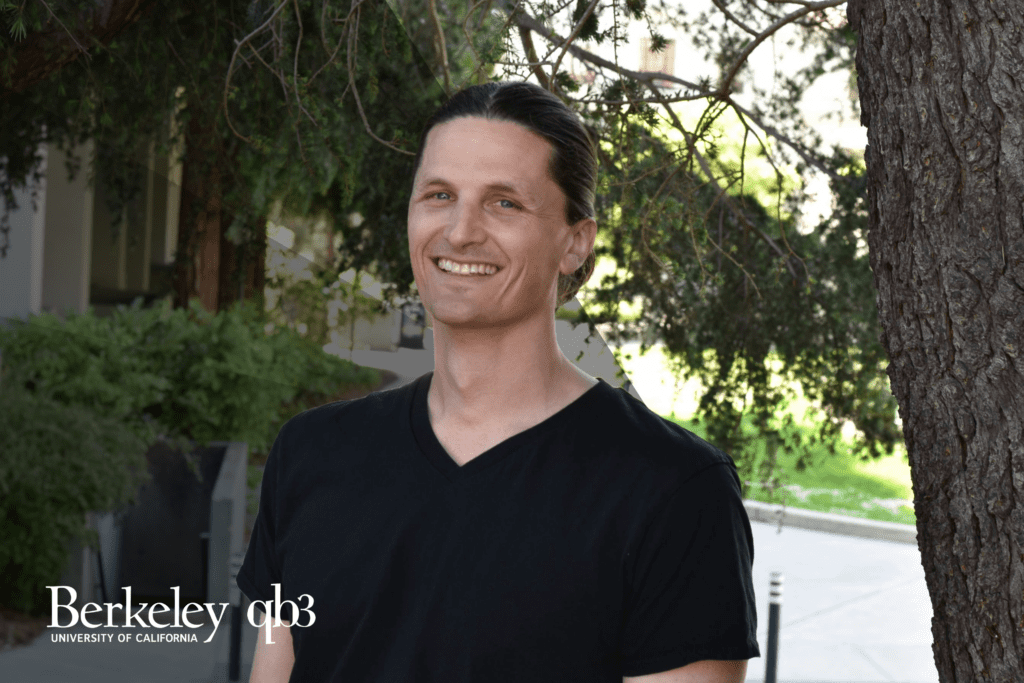Iain Clark is an assistant professor in the Department of Bioengineering. The Clark lab’s research combines methods from multiple disciplines—molecular biology, microfluidics, engineering, and bioinformatics—to develop new single-cell genomics tools. The lab’s current work is focused on understanding how HIV evades the immune system and elucidating cellular interactions that control neurologic diseases.
QB3-Berkeley: What’s an exciting question that your lab is trying to answer?
Iain Clark: Broadly speaking, our work lives at the interface between biology and technology. We combine molecular biology with microfluidics tools to build new methods to study individual cells. One of the most exciting areas that we’re trying to apply these tools to is the study of HIV persistence. HIV is, as you know, incurable. Our work aims to understand why HIV can persist in people indefinitely, even though they’re on effective antiretrovirals.
QB3: What is the biggest challenge and greatest reward of running your own lab?
IC: The biggest challenge is limiting the non-science related tasks that pull me away from thinking about research. It’s been hard to put boundaries on the non-science requirements of running a lab.
The greatest reward for me in science has always been the possibility of discovering or building something new. Getting to explore an idea that no one has worked on before, even if it’s small, is a great joy for me. That sense of possibility has been a driving force for me to remain in science. If we have an idea, or we explore something in great depth—we may make a discovery that no one has ever made before. And it’s not delusions of grandeur. It’s just fun, I believe, to have the opportunity to discover something new.

QB3: What’s something that you wish someone would ask you about your work?
IC: I wish I had more time to explain how the work in a paper evolved—everything that goes into getting a result that doesn’t get fully explained in the methods or supplemental. And maybe that’s why we go to conferences, and we try to lay it out for each other in that setting. But I would love to have more time to explain all the challenges that went into solving the problems, not just the polished result. Because often in a paper all the rough edges get smoothed out. Other scientists don’t see the trajectory of each project, the failure points, and the dead ends and changing directions that were necessary to arrive at the finished paper.
For example, we just published an HIV paper where there were so many challenges along the way, and we had to essentially abandon a significant amount of work and change directions to solve what seemed like a never-ending series of new challenges. And that, of course, will never be explained because that’s not what the published paper is about.
QB3: Amy Pickering and you are both UC Berkeley faculty members; could you please tell us how you two approached searching for positions at the same university?
IC: Ultimately, I don’t think anyone has a good answer or a one-size-fits-all response for this question. It’s incredibly difficult to solve the ‘two-body problem.’ I didn’t think we were going to solve it, but we’ve always just been very supportive of each other, and we both love science. Careers move forward in fits and starts. If one of us had a good opportunity, we let that person charge ahead, and the other person followed suit. Luckily, we both got to a point in our careers where we were ready to start labs and were both accomplished enough to be competitive in the academic job market.
QB3: How do you juggle being two working scientists with a family?
IC: It’s gotten easier. The hardest years were when we had little, little ones. There was a point when I postdoc, and I was bike commuting 45-60 minutes in the snow in Boston and still had to make daycare pickup. The kids have gotten older, and they’re more manageable and it’s finally easier, thank goodness. Having kids is a challenge for any career. And, again, there’s a lot of give and take that both people have to do to accommodate schedules. That’s one thing about being an academic: We travel a lot and work late, so there’s a lot of single parenting that happens.
QB3: What do you like about living in the Bay Area?
IC: The Bay Area has something for everybody. It’s hard not to find either something outdoors that you love doing, or a group of people who are interested in similar things. I play a bit of soccer. When we were out here for grad school, I climbed a lot and got outside a lot. I like being in the Bay, because we can get to the water, and we can get to the mountains. The weather here is beautiful. We can be active most of the year, which is different than the Northeast for sure.
QB3: What’s your favorite part of being a UC Berkeley faculty member?
IC: I did my PhD here, so I had an early taste of the community that Berkeley is, but I’ve been so supported by faculty in the Bioengineering Department who have made me feel incredibly welcome. I feel like my colleagues are my friends, so there’s a positive, collegial outlook that I really benefit from in the department, as well as in the larger community of scientists at Berkeley. Everyone’s passionate about science in a non-competitive way. I find that everyone is willing to help out altruistically just for the sake of doing science because they’re genuinely interested in contributing to others’ research. That’s very refreshing.